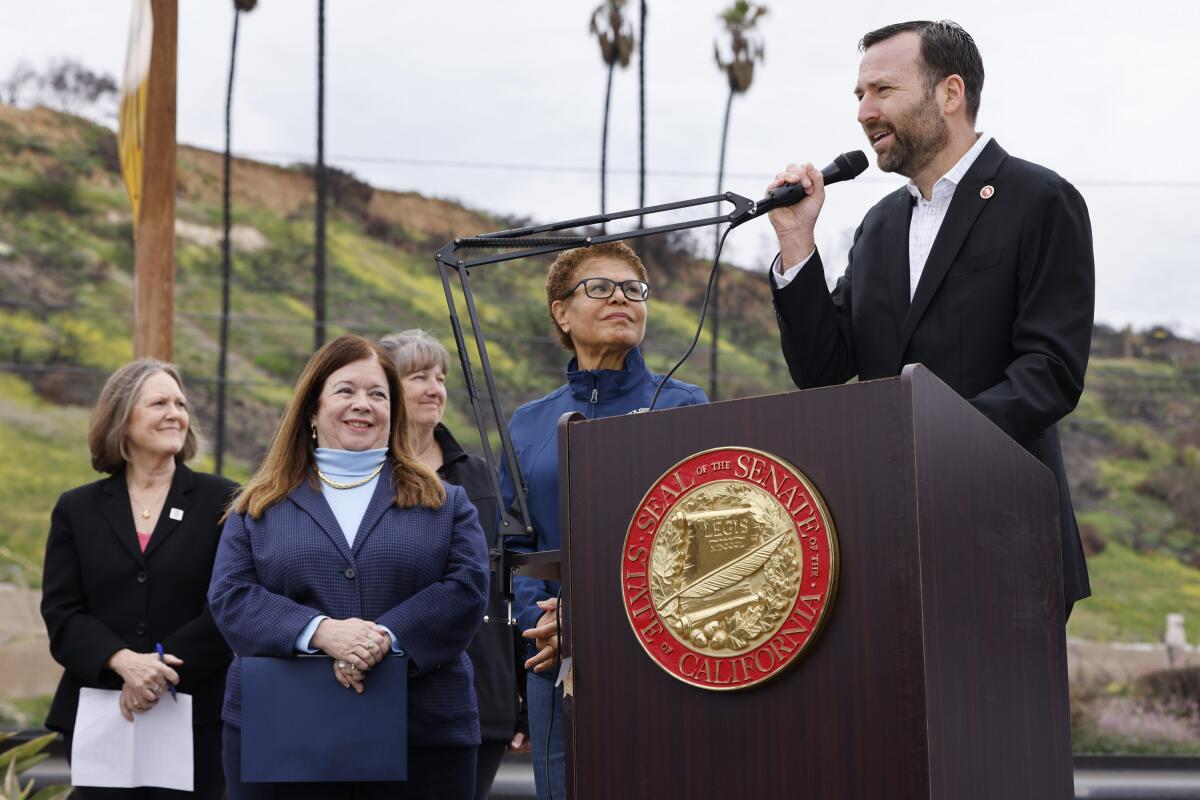California legislators introduce bill package to address wildfires
Two months after the anniversary of the devastating Southern California firestorms, several legislators at the state Capitol unveiled a package of bills aimed at preventing wildfires and lessening their harms.
“California has reached a tipping point,” Assemblymember Steve Bennett (D-Ventura) said during a news conference Wednesday. “In the last nine years, we’ve had the eight largest fires in the history of California — we shouldn’t have this problem.”
Two of the most destructive wildfires ever in California erupted on the same day last January. The fires devastated Pacific Palisades and Altadena — destroying homes and businesses, displacing residents and killing 31 people. The Palisades and Eaton fires caused an estimated economic loss of $250 billion.
Among the dozen bills announced Wednesday were:
- Assembly Bill 1934, carried by Bennett, would require the state fire marshal’s Wildfire Mitigation Advisory Committee to develop a home hardening certification program. (Home hardening involves using ignition-resistant materials to make houses less vulnerable to embers or flames.)
- Senate Bill 1079, from Sen. Henry Stern (D-Los Angeles), would create a Fire Innovation Unit within the California Department of Forestry and Fire Protection. The unit would serve as a hub for wildfire technology research and deployment.
- Assembly Bill 1699, by Assemblymember Chris Rogers (D-Santa Rosa), would indefinitely extend the Prescribed Fire Liability Program and expand program eligibility.
- Assembly Bill 1891, by Assemblymember Damon Connolly (D-San Rafael), would create the Beneficial Fire Capacity Program to expand training and support for community-led beneficial fire programs, including those developed by universities, volunteer fire districts and California Native American tribes.
- Senate Bill 894, from Sen. Benjamin Allen (D-Santa Monica), would state the intent of the Legislature to create the California Wildfire Resilience Program, which would increase access to home hardening modifications.
Allen, who represents the Palisades, said neighborhoods are being turned upside down by wildfires.
“Modern fires are now spreading from wild lands into urban communities,” he said. “The reality that so many people in my district have been living through over this past year has been immensely challenging. Tens of thousands of families remain displaced from their homes.”

State Sen. Benjamin Allen (D-Santa Monica) hosts a discussion with local leaders and residents to mark 100 days since the start of the L.A. County wildfires at Will Rogers State Beach on April 17, 2025, in Los Angeles.
(Carlin Stiehl/Los Angeles Times)
Many fire survivors have expressed anger over government action that they believe enabled the disaster and hindered recovery efforts. When asked whether the Legislature had plans to dissect the response, Allen said he would support a robust investigation.
“I think the public is expecting that the state is really looking into this,” he said. “But I know there’s always 10 million different priorities around here — one of my jobs as somebody who represents these folks is to make sure it continues to be on the radar screen.”
Bennett said Californians had a right to expect oversight and transparency but should not “expect perfection” during emergencies.
“I think we are best in California if we develop a culture where everybody says, ‘You do the best you can,’” he said. “I think we would be better off.”
Survivors in Altadena and Pacific Palisades recently marked the anniversary of the disaster with solemn memorial services.
“This year has been the hardest year of our lives,” Joy Chen, executive director of the Eaton Fire Survivors Network, said during a service in Altadena. “Unimaginable grief. The 31 people who died that day, and the hundreds who have died prematurely since. Homes lost. Jobs lost. Incomes lost. A sense of safety and identity stripped away.”
